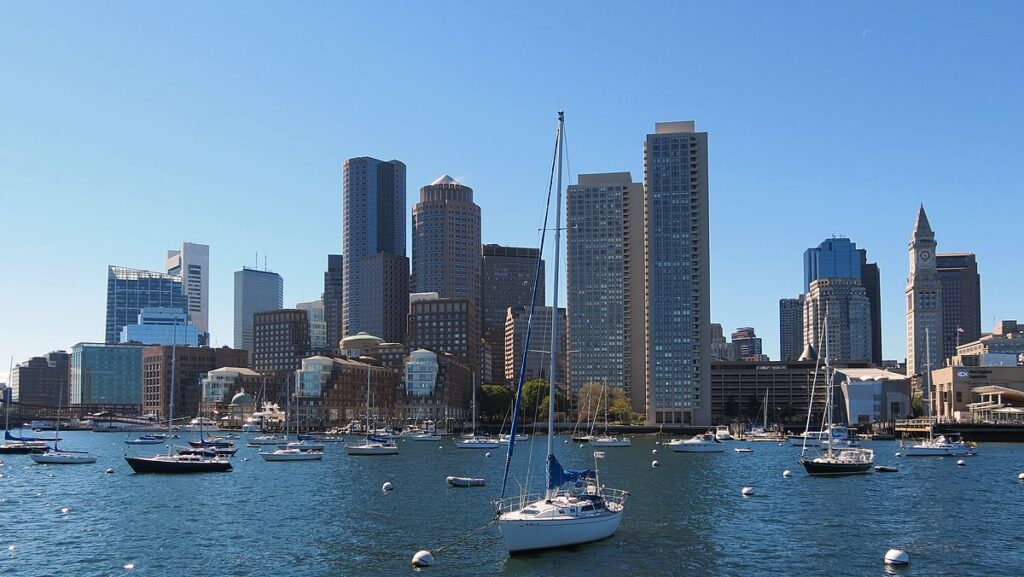
Moving to Boston, Massachusetts: A Comprehensive Relocation Guide
Considering moving to Boston, Massachusetts? This historic city offers world-class education, innovation economy, and New England character. With approximately 675,000 residents in 2025 (metro 4.9 million+), Boston combines revolutionary history with modern excellence and America’s most educated destination.
Demographic Profile to Consider If Moving to Boston:
Boston’s 2025 population is approximately 675,000 residents, making it Massachusetts’ capital and largest city, with the metro exceeding 4.9 million. The median age is around 32 years, heavily influenced by the massive student population. The population is approximately 52% White, 25% Black or African American, 20% Hispanic, 10% Asian. Boston features distinct neighborhoods from historic Beacon Hill to vibrant Back Bay to Irish Southie, world-class universities (Harvard, MIT nearby; BU, BC, Northeastern in city), innovation economy, and serves as New England’s capital. The city attracts students from worldwide, young professionals in tech/biotech/finance, academics and researchers, diverse residents, and those seeking America’s most educated and historic city. Boston appeals to extremely educated residents valuing intellectual atmosphere, innovation, history, and urban sophistication. The community balances historic preservation with innovation economy and maintaining neighborhood character. Find trusted local services for moving, living, and working in Boston.Boston Relocation Directory
Cost of Living to Consider If Moving to Boston:
Boston represents ultra-premium costs among America’s highest. Median home values range from $650,000 to $1.2 million+ in 2025, varying dramatically by neighborhood with South End, Back Bay, and Beacon Hill exceeding $2 million. The median household income is approximately $85,000. Rental properties average $2,500 to $4,500+ monthly, with student apartments abundant but expensive. Massachusetts has flat income tax 5.0%. Overall cost of living is among America’s highest, making Boston challenging for most though salaries in tech, biotech, and finance compensate. The city attracts students, high-earning professionals, and those prioritizing education and innovation. Housing costs are among America’s most expensive requiring significant income.
Economy and Job Market:
Boston’s economy revolves around higher education and research, biotech and life sciences, technology, finance, and healthcare. The massive academic presence (65+ colleges and universities in metro) drives innovation. Major employers include Massachusetts General Hospital, Brigham and Women’s Hospital, other world-class hospitals, universities employing thousands, biotech companies throughout, financial services, technology companies, and startups. The innovation economy creates exceptional opportunities. Biotech corridor along Route 128 and Cambridge provides life sciences jobs. Finance sector remains strong. Healthcare employs extensively. Typical industries include biotech, technology, finance, healthcare, education, and startups. Salaries are very high in tech, biotech, finance though cost of living offsets gains. The job market attracts the world’s brightest talent seeking innovation economy opportunities.
Education:
Boston Public Schools serves city students with numerous schools. Quality varies dramatically requiring extensive research with some excellent exam schools (Boston Latin School, oldest public school in America) and others struggling. The concentration of world-class universities creates unparalleled intellectual atmosphere with Harvard and MIT in Cambridge, BU, BC, Northeastern, Tufts, and 60+ other institutions. The academic presence defines Boston more than any other city.
Recreation and Lifestyle:
Boston offers REVOLUTIONARY HISTORY EVERYWHERE with Freedom Trail connecting 16 historic sites, Boston Common (America’s oldest public park), Faneuil Hall, Old North Church, and Paul Revere House. The city features stunning Back Bay with brownstones and Newbury Street shopping, historic Beacon Hill with gas lamps and brick sidewalks, North End (Italian neighborhood with incredible restaurants), Fenway Park (iconic 1912 ballpark, Red Sox creating religion-level passion), world-class museums including MFA and Isabella Stewart Gardner, beautiful Charles River Esplanade, and vibrant neighborhoods each with distinct character. Residents enjoy Red Sox games at Fenway creating city-wide passion, Boston Marathon (Patriots’ Day tradition), Celtics and Bruins creating sports obsession, Harvard Square and Cambridge culture, exceptional seafood and Italian food in North End, world-class symphony and culture, T subway system enabling car-free living, and four-season activities. The lifestyle emphasizes intellectual atmosphere and education (most educated metro in America), innovation and entrepreneurship, sports fanaticism (Red Sox, Celtics, Bruins, Patriots), revolutionary history pride, neighborhood loyalty, and sophisticated urban culture. The four-season New England climate features cold, snowy winters and pleasant summers. The community fiercely values education and intellectualism (defining characteristic), Red Sox and sports teams, revolutionary history, neighborhood identity, academic excellence, and innovation economy. Living in Boston means accepting America’s highest or near-highest costs, brutal winter weather, expensive and challenging parking, T subway aging infrastructure, neighborhood research critical, Massachusetts liberal politics, reserved New England character, and prioritizing education and innovation while experiencing AMERICA’S MOST EDUCATED AND HISTORIC CITY with revolutionary history everywhere, world’s greatest academic concentration, innovation economy opportunities, Fenway Park magic, exceptional culture and museums, neighborhood character, walkable urban core, and intellectual sophistication creating the ultimate destination for those valuing education and history where revolutionary heritage meets innovation economy and academic excellence defines America’s most educated city.
Healthcare and Services:
Boston residents access world-class healthcare through Massachusetts General Hospital (consistently #1 or top-ranked nationally), Brigham and Women’s Hospital, Dana-Farber Cancer Institute, Boston Children’s Hospital, and the greatest concentration of medical excellence anywhere. The healthcare and medical research are unparalleled globally.
Transportation:
Boston is accessed via Interstate 90 (Mass Pike), Interstate 93, and various corridors. Logan International Airport provides excellent service. MBTA (The T) operates subway, bus, and commuter rail with extensive service though aging infrastructure. Many neighborhoods offer excellent walkability. Boston is very bike-friendly with growing infrastructure. Many residents live car-free using T and bikes. Typical commute times within metro are 25-50 minutes.
Conclusion:
Moving to Boston in 2025 offers life in America’s most educated and historic city with world-class universities, innovation economy, and revolutionary heritage. The city’s combination of academic excellence, biotech opportunities, and Fenway Park magic makes it ideal for students, professionals, and those seeking the ultimate destination where revolutionary history meets innovation and education defines America’s most intellectual and historic city.

